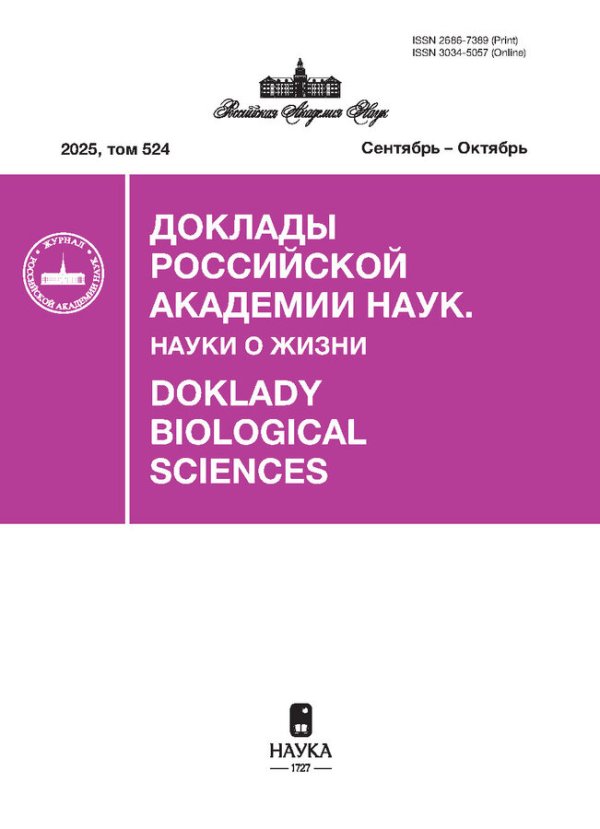Oocyte size suggests the presence of larvae in deep-sea acorn worms Torquaratoridae (Hemichordata, Enteropneusta)
- Authors: Ezhova O.V.1, Lukinykh A.I.1, Malakhov V.V.1
-
Affiliations:
- Lomonosov Moscow State University
- Issue: Vol 520, No 1 (2025)
- Pages: 10-13
- Section: Articles
- URL: https://journals.rcsi.science/2686-7389/article/view/287081
- DOI: https://doi.org/10.31857/S2686738925010028
- EDN: https://elibrary.ru/tdonos
- ID: 287081
Cite item
Abstract
It is known that the type of development of marine invertebrates is related to the size of the eggs. Data on the maximum size of oocytes of deep-sea acorn worms of the Torquaratoridae family are presented. It has been suggested that among the Torquaratoridae there are species with direct development, species with lecithotrophic larvae and species with planktotrophic larvae. Mysterious giant larvae of Planctosphaera pelagica may be planktotrophic larvae of Torquaratoridae.
Full Text
About the authors
O. V. Ezhova
Lomonosov Moscow State University
Author for correspondence.
Email: olga_ejova@mail.ru
Russian Federation, Moscow
A. I. Lukinykh
Lomonosov Moscow State University
Email: olga_ejova@mail.ru
Russian Federation, Moscow
V. V. Malakhov
Lomonosov Moscow State University
Email: olga_ejova@mail.ru
Academician of the RAS
Russian Federation, MoscowReferences
- Holland N.D., Clague D.A., Gordon D.P., et al. ‘Lophenteropneust’ hypothesis refuted by collection and photos of new deep-sea hemichordates // Nature. 2005. Vol. 434. No. 7031. P. 374–376.
- Holland N.D., Jones W.J., Ellena J., et al. A new deep-sea species of epibenthic acorn worm (Hemichordata, Enteropneusta) // Zoosystema. 2009. Vol. 31. No. 2. P. 333–346.
- Holland N.D., Kuhnz L.A., Osborn K.J. Morphology of a new deep-sea acorn worm (class Enteropneusta, phylum Hemichordata): A part-time demersal drifter with externalized ovaries // J. Morphol. 2012. Vol. 273. No. 7. P. 661–671.
- Priede I.G., Osborn K.J., Gebruk A.V., et al. Observations on torquaratorid acorn worms (Hemichordata, Enteropneusta) from the North Atlantic with descriptions of a new genus and three new species // Invert. Biol. 2012. Vol. 131. No. 3. P. 244–257.
- Osborn K.J., Gebruk A.V., Rogacheva A., et al. An externally brooding acorn worm (Hemichordata, Enteropneusta, Torquaratoridae) from the Russian Arctic // Biol. Bull. 2013. Vol. 225. No. 2. P. 113–123.
- Jabr N., Archambault P., Cameron C.B. Biogeography and adaptations of torquaratorid acorn worms (Hemichordata: Enteropneusta) including two new species from the Canadian Arctic // Can. J. Zool. 2018. Vol. 96. No. 11. P. 221–1229.
- Holland N.D., Hiley A.S., Rouse G.W. A new species of deep-sea torquaratorid enteropneust (Hemichordata): A sequential hermaphrodite with exceptionally wide lips // Invert. Biol. 2022. Vol. 141. e12379.
- Rybakova E., Galkin S., Gebruk A., et al. Vertical distribution of megafauna on the Bering Sea slope based on ROV survey // PeerJ. 2020. Vol. 8. e8628.
- Thorson G. Reproductive and larval ecology of marine bottom invertebrates // Biol. Rev. 1950. Vol. 25. P. 1–45.
- Vance R.R. On reproductive strategies in marine benthic invertebrates // Amer. Nat. 1973. Vol. 107. No. 955. P. 339–352.
- Marshall D.J., Keough M.J. The evolutionary ecology of offspring size in marine invertebrates // Adv. Mar. Biol. 2008. Vol. 53. P. 1–60.
- Urata M., Yamaguchi M. The development of the enteropneust hemichordate Balanoglossus misakiensis Kuwano // Zool. Sci. 2004. Vol. 21. P. 533–540.
- Urata M., Iwasaki S., Ohtsuka S., et al. Development of the swimming acorn worm Glandiceps hacksi: similarity to holothuroids // Evol. Dev. 2014. Vol. 16. P. 149–154.
- Lin C.Y., Tung C.H., Yu J.K., et al. Reproductive periodicity, spawning induction, and larval metamorphosis of the hemichordate acorn worm Ptychodera flava // J. Exp. Zool. B. Mol. Dev. Evol. 2016. Vol. 326. P. 47–60.
- Gonzalez P., Jiang J.Z., Lowe C.J. The development and metamorphosis of the indirect developing acorn worm Schizocardium californicum (Enteropneusta: Spengelidae) // Front. Zool. 2018. Vol. 15. 26.
- Davis B.M. The early life history of Dolichoglossus pusillus Ritter // Univ. Calif. Publs. Zool. 1908. Vol. 4. P. 187–226.
- Burdon-Jones C. Development and biology of the larva of Saccoglossus horsti (Enteropneusta) // Phil. Trans. Roy. Soc. Ser. B. 1952. Vol. 236. P. 553–590.
- Kaul-Strehlow S., Thomas S. A detailed description of the development of the hemichordate Saccoglossus kowalevskii using SEM, TEM, Histology and 3D-reconstructions // Front. Zool. 2013. Vol. 10. 53.
- Pawson D.L., Gage J.D., Belyaev G.M., et al. The deep sea synaptid Protankyra brychia (Echinodermata: Holothuroidea) and its nearsurface dwelling planktotrophic larva, Auricularia nudibranchiata // Sarsia. 2003. Vol. 88. No 3. P. 159–174.
- Spengel J.W. Planctosphaera pelagica // Rep. Sci. Res.’Michael Sars’ North Atlantic Deep Sea Expedition. 1932. Vol. 5. P. 1–28.
Supplementary files











